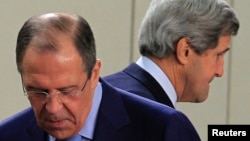BRUSSELS —
U.S. Secretary of State John Kerry and Russian Foreign Minister Sergei Lavrov offered starkly different views of the Syrian civil war Tuesday, after meeting at NATO headquarters.
The United States wants Russia to convince Syrian President Bashar al-Assad to step down, but Russia refuses. Secretary Kerry tried to downplay the differences.
“There's a difference of opinion between Russia and the United States with respect to when or how Assad might leave. I don't think there's a difference of opinion that his leaving may either be inevitable or necessary to be able to have a solution,” Kerry said.
But Russia says the shape of a Syrian political settlement must be decided by the Syrians themselves, including President Assad. At a news conference, Foreign Minister Lavrov accused Western nations of blocking a series of peace efforts, and said if that continues, Syria could come under the control of radical Islamists.
“Over the last months, there is a growing understanding of real threats we will all face if this status quo maintains, if all efforts to build dialogue will be hindered and blocked by the minority of the international community, which is very aggressive and very bloodthirsty,” Lavrov said.
Lavrov said there is a growing feeling among Russia's allies that efforts to resolve the Syrian conflict are failing, and he called on all “international players” to bring the Syrian parties to the negotiating table.
Secretary Kerry said he and Minister Lavrov did agree to keep talking about the issue, and he indicated some new ideas are on the table.
“Foreign Minister Lavrov and I talked about a number of different ways in which one might try to figure out if you could create a reality to this diplomatic initiative. And we're both going to go back. We're going to explore those possibilities. And we're going to talk again about if any of those other avenues could conceivably be pursued,” Kerry said.
Those avenues do not include Western military intervention. NATO Secretary General Anders Fogh Rasmussen said Tuesday the Syrian war could cause security problems for the region, and beyond. But he said no one is calling for NATO to play any direct role in the crisis.
The United States wants Russia to convince Syrian President Bashar al-Assad to step down, but Russia refuses. Secretary Kerry tried to downplay the differences.
“There's a difference of opinion between Russia and the United States with respect to when or how Assad might leave. I don't think there's a difference of opinion that his leaving may either be inevitable or necessary to be able to have a solution,” Kerry said.
But Russia says the shape of a Syrian political settlement must be decided by the Syrians themselves, including President Assad. At a news conference, Foreign Minister Lavrov accused Western nations of blocking a series of peace efforts, and said if that continues, Syria could come under the control of radical Islamists.
“Over the last months, there is a growing understanding of real threats we will all face if this status quo maintains, if all efforts to build dialogue will be hindered and blocked by the minority of the international community, which is very aggressive and very bloodthirsty,” Lavrov said.
Lavrov said there is a growing feeling among Russia's allies that efforts to resolve the Syrian conflict are failing, and he called on all “international players” to bring the Syrian parties to the negotiating table.
Secretary Kerry said he and Minister Lavrov did agree to keep talking about the issue, and he indicated some new ideas are on the table.
“Foreign Minister Lavrov and I talked about a number of different ways in which one might try to figure out if you could create a reality to this diplomatic initiative. And we're both going to go back. We're going to explore those possibilities. And we're going to talk again about if any of those other avenues could conceivably be pursued,” Kerry said.
Those avenues do not include Western military intervention. NATO Secretary General Anders Fogh Rasmussen said Tuesday the Syrian war could cause security problems for the region, and beyond. But he said no one is calling for NATO to play any direct role in the crisis.




